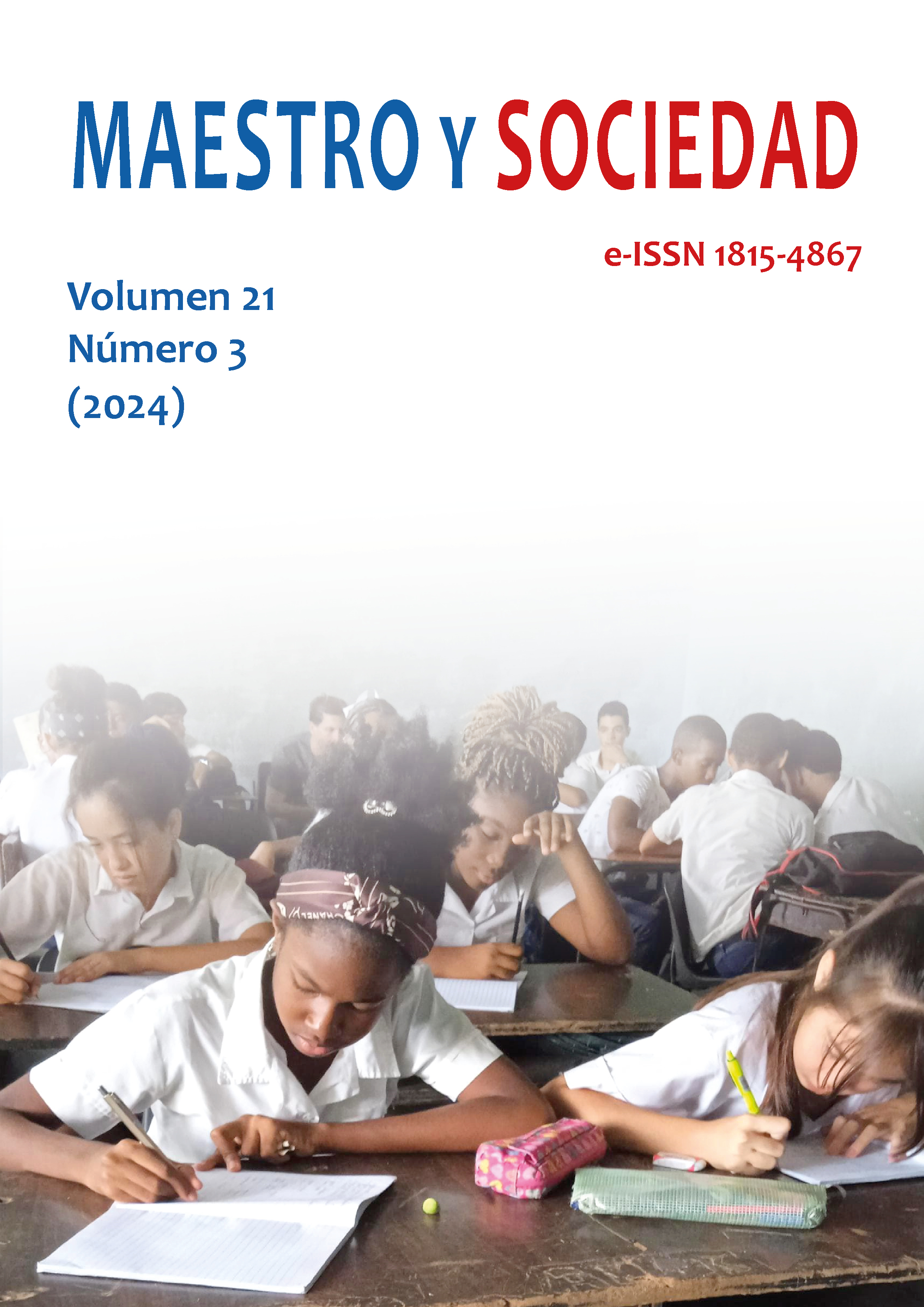Play guide to strengthen attention and concentration in initial education children II
Keywords:
playful activities; attention; concentration; memory games; Preschool EducationAbstract
Introduction: In the course of their educational work in early childhood education, teachers may face challenges where poor attention and concentration negatively affect children's learning and academic performance. Objective: Develop a playful guide based on memory games to contribute to strengthening the concentration and attention of the children in Early Education II at the Howard Gardner Early Education Center in Portoviejo. Materials and Methods: A research was carried out with a quantitative-qualitative or mixed descriptive approach, with a non-experimental and transversal design. Results: By applying an observation guide to the children and an interview with the teacher, it was determined that the children presented significant difficulties in attention and concentration, with marked individual variability. Discussion: The activities developed in the classroom for this purpose were applied randomly, without following a structured guide and without keeping track of their results. Conclusions: Based on the findings, recreational activities were proposed that the teacher could implement in a planned manner in the classroom, and then evaluate their impact on the development of children's attention and concentration.
References
Alzubi, T., Fernández, R., Flores, J., Duran, M., & Cotos, J. M. (2018). Improving the working memory during early childhood education through the use of an interactive gesture game-based learning approach. IEEE Access, 6, 53998-54009. https://doi.org/10.1109/ACCESS.2018.2870575
Arias Sierra, A. R., & Huaynate Aliano, J. M. (2021). El juego como estrategia pedagógica para mejorar el proceso de atención y concentración de los niños de 5 años de la Institución Educativa" Santa Rosa de Lima"-Yanacancha-Pasco. [Tesis de grado, Universidad Nacional Daniel Alcides Carrión] Repositorio Institucional de la Universidad Nacional Daniel Alcides Carrión. http://repositorio.undac.edu.pe/bitstream/undac/2204/1/T026_48021964_T.pdf
Biele, G., Overgaard, K. R., Friis, S., Zeiner, P., & Aase, H. (2022). Cognitive, emotional, and social functioning of preschoolers with attention deficit hyperactivity problems. BMC psychiatry, 22(1), 1-10. https://bmcpsychiatry.biomedcentral.com/articles/10.1186/s12888-021-03638-9
Código de la niñez y adolescencia. (2003, 3 de enero). Registro Oficial 737. https://www.acnur.org/fileadmin/Documentos/BDL/2014/9503.pdf
Coq, J. M., & Gerardin, P. (2020). Desarrollo psicológico del niño. EMC-Pediatría, 55(2), 1-9. https://doi.org/10.1016/S1245-1789(20)43834-X
Cornejo, M. A. N., Desiderio, S. V. E., & Méndez, M. M. S. (2024). Incidencia del arte en el desarrollo cognitivo de niños de 4 a 5 años. Revista Boliviana de Educación, 6(10), 46-60. https://revistarebe.org/index.php/rebe/article/view/1233
Escorza, Y. H., & Aradillas, A. L. S. (2020). Teorías del aprendizaje en el contexto educativo. Editorial Digital del Tecnológico de Monterrey.
Fernández, M. (2022). Conductas disruptivas y clima de aula: Una propuesta para favorecer el manejo de conflictos en la sala de kínder. [Tesis doctoral, Universidad del Desarrollo]. Repositorio Institucional de la Universidad del Desarrollo. https://repositorio.udd.cl/server/api/core/bitstreams/612ec06d-9a44-4208-8d02-42820ad9085e/content
Hernández-Sampieri, R., & Mendoza, C. (2020). Metodología de la investigación: las rutas cuantitativa, cualitativa y mixta. Mcgraw-hill. https://n9.cl/4dyi9
Lamrani, R., & Abdelwahed, E. H. (2020). Game-based learning and gamification to improve skills in early years education. Computer Science and Information Systems, 17(1), 339-356. https://doi.org/10.2298/CSIS190511043L
Lewin, K. (1923). Field theory and experiment in social psychology: Concepts and methods. American Journal of Sociology, 44(6), 868-896. https://www.journals.uchicago.edu/doi/abs/10.1086/218177
Liberio Ambuisaca, X. P. (2019). El uso de las técnicas de gamificación en el aula para desarrollar las habilidades cognitivas de los niños y niñas de 4 a 5 años de Educación Inicial. Conrado, 15(70), 392-397. https://n9.cl/uupnv
Luque, M. E. (2020). Sudoku como herramienta para elevar el nivel de concentración de los estudiantes del primer grado de educación secundaria de la institución educativa “Simón Bolívar”, de Moquegua – 2019 [Tesis de grado, Universidad Nacional de San Agustín] Repositorio Institucional de la Universidad Nacional de San Agustín. https://repositorio.unsa.edu.pe/items/a24bbda1-32ef-4d90-8732-ea5ce99e22b3
Machado-Bagué, M. É., Márquez-Valdés, A. M., & Acosta-Bandomo, R. U. (2021). Consideraciones teóricas sobre la concentración de la atención en educandos. Revista de Educación y Desarrollo, 59(8), 75-82. https://www.cucs.udg.mx/revistas/edu_desarrollo/anteriores/59/59_Machado.pdf
Ministerio de Educación del Ecuador. (2014). Currículo de Educación Inicial. https://n9.cl/47zr
Mirzamaxmudovna, X. N., & Raximovna, A. N. (2023). Problems of development and psychological characteristics of preschool children. International Journal of Early Childhood Special Education, 15(1). https://doi.org/10.48047/INTJECSE/V15I1.14
Montessori, M. M. (1976). Education for Human Development: Understanding Montessori. Eric. https://eric.ed.gov/?id=ED136940
Organización de las Naciones Unidas para la Educación, la Ciencia y la Cultura. [UNESCO]. (2009). Why Games can be Effective Pedagogy? https://mgiep.unesco.org/article/why-games-can-be-effective-pedagogy
Oropeza-Bahena, G., López-Sánchez, J. D., & Granados-Ramos, D. E. (2019). Hábitos de sueño, memoria y atención en niños escolares. Revista mexicana de neurociencia, 20(1), 42-49. https://www.medigraphic.com/cgi-bin/new/resumen.cgi?IDARTICULO=85931
Ovalle Charry, S. J. (2023). Cartilla didáctica con juegos que fortalecen la atención y la concentración de los niños en la Institución Educativa Santa Teresa Líbano Tolima [Tesis de maestría, Fundación Universitaria Los Libertadores]. Repositorio Institucional de la Fundación Universitaria Los Libertadores. https://repository.libertadores.edu.co/items/3763d1f3-213e-4462-8b40-4b75fc56a0e4
Pavez Rubio, V. A., & Zavala Ramírez, C. X. (2018). Estrategias pedagógicas dirigidas a educadoras para el segundo ciclo de educación parvularia que permitan favorecer la autorregulación del comportamiento [Tesis doctoral, Universidad Finis Terrae]. Repositorio Institucional de la Universidad Finis Terrae. https://repositorio.uft.cl/server/api/core/bitstreams/75efa01c-d8fd-4f8b-a16d-2725659724cd/content
Piaget, J. (1976). Desarrollo cognitivo. Fomtaine. https://n9.cl/9iqyx
Ruiz, C. A. (2022) Actividades prácticas para fortalecer la concentración en niños y niñas de 4 a 5 años durante el proceso de formación integral en la Unidad Educativa Ciudad de Ibarra período 2020 – 2021. [Tesis de grado, Universidad Técnica del Norte] Repositorio Institucional de la de grado, Universidad Técnica del Norte. https://n9.cl/v7q9h
Sánchez, J. (2019). Desarrollo de los procesos cognitivos de atención y concentración en Educación Inicial. Alternancia-Revista de Educación e Investigación, 1(1), 47-63. https://doi.org/10.33996/alternancia.v1i1.62
Vygotsky, L. (2000). Hacia un nuevo rol docente. Troquel.
Vygotski, L. (1929). The problem of the cultural development of the child. The Pedagogical Seminary and Journal of Genetic Psychology, 36(3), 415-432. https://www.tandfonline.com/doi/pdf/10.1080/08856559.1929.10532201
Published
How to Cite
Issue
Section
License
Copyright (c) 2024 María José Giler Cedeño, Hipatia Alexandra Meza Intriago

This work is licensed under a Creative Commons Attribution-NonCommercial-NoDerivatives 4.0 International License.
This journal provides immediate open access to its content, based on the principle that offering the public free access to research helps a greater global exchange of knowledge. Each author is responsible for the content of each of their articles.



























 Universidad de Oriente
Universidad de Oriente 